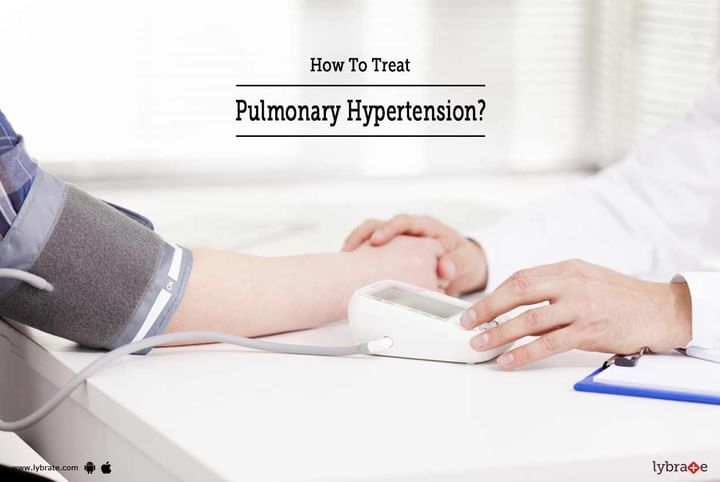How To Treat Pulmonary Hypertension?
Pulmonary hypertension mainly occurs due to narrowing of the arteries of the lungs as a result of which the flow of blood is restricted. In this kind of condition, blood fails to carry oxygen to your heart and thus your heart gets adversely affected. The blood pressure of your body will get increased to a great extent if this situation remains untreated, thus leading to bdreadful consequenses, specifically situation like heart failure, serious pulmonary diseases, blood clots in lungs and congenial heart defects, etc.
There are certain forms of pulmonary hypertension, which are serious in nature and worsen with time, so much so that they are even fatal at times. It also includes forms which are non curable in nature, however, in order to improve the quality of life, symptoms can be reduced with proper treatment. The treatment for pulmonary hypertension is often complex and it takes some time to find the most appropriate treatment and requires extensive follow-up care. Your doctor might also need to change your treatment if it's no longer effective. However, when pulmonary hypertension is caused by another condition, your doctor will treat the underlying cause whenever possible.
Common Treatments for pulmonary hypertension:
Medications:
- Blood vessel dilators (vasodilators): Vasodilators open narrowed blood vessels. They are one of the most commonly prescribed vasodilators for pulmonary hypertension is epoprostenol (Flolan, Veletri). The drawback to epoprostenol is that the effect lasts only for few minutes. This drug is continuously injected through an intravenous (IV) catheter via a small pump that you wear in a pack on your belt or shoulder.
- Ventavis: Another form of the drug, iloprost (Ventavis), can be inhaled six to nine times a day through a nebulizer, a machine that vaporizes your medication. Because it's inhaled, it goes directly to the lungs.
- Treprostinil (Tyvaso, Remodulin, Orenitram): It is another form of the drug, which can be given four times a day and can be inhaled or can be taken as an oral medication and can also be administered through injection.
- Endothelin receptor antagonists: These medications reverse the effect of endothelin, a substance in the walls of blood vessels that causes them to narrow. These drugs may improve your energy level and symptoms. However, these drugs shouldn't be taken if you're pregnant. Also, these drugs can damage your liver and you may need monthly liver monitoring.
- Sildenafil and tadalafil: Sildenafil (Revatio, Viagra) and tadalafil (Cialis, Adcirca) are sometimes used to treat pulmonary hypertension. These drugs work by opening the blood vessels in the lungs to allow blood to flow through more easily.
- High-dose calcium channel blockers: These drugs help relax the muscles in the walls of your blood vessels. They include medications, such as amlodipine (Norvasc), diltiazem (Cardizem, Tiazac, others) and nifedipine (Procardia, others). Although calcium channel blockers can be effective, only a small number of people with pulmonary hypertension respond to them.
- Soluble guanylate cyclase (SGC) stimulator: Soluble guanylate cyclase (SGC) stimulators (Adempas) interact with nitric oxide and help relax the pulmonary arteries and lower the pressure within the arteries. These medications should not be taken if you're pregnant. They can sometimes cause dizziness or nausea.
- Anticoagulants: Your doctor is likely to prescribe the anticoagulant warfarin (Coumadin, Jantoven) to help prevent the formation of blood clots within the small pulmonary arteries. Because anticoagulants prevent normal blood coagulation, they increase your risk of bleeding complications. Take warfarin exactly as prescribed, because warfarin can cause severe side effects if taken incorrectly. If you're taking warfarin, your doctor will ask you to have periodic blood tests to check how well the drug is working. Many other drugs, herbal supplements and foods can interact with warfarin, so be sure your doctor knows all of the medications you're taking.
- Digoxin: Digoxin (Lanoxin) can help the heart beat stronger and pump more blood. It can help control the heart rate if you experience arrhythmias.
- Diuretics: Commonly known as water pills, these medications help eliminate excess fluid from your body. This reduces the amount of work your heart has to do. They may also be used to limit fluid buildup in your lungs.
- Oxygen: Your doctor might suggest that you sometimes breathe pure oxygen, a treatment known as oxygen therapy, to help treat pulmonary hypertension, especially if you live at a high altitude or have sleep apnea. Some people who have pulmonary hypertension eventually require continuous oxygen therapy.
Surgeries:
- Atrial Septostomy: If medications don't control your pulmonary hypertension, this open heart surgery might be an option. In an atrial septostomy, a surgeon will create an opening between the upper left and right chambers of your heart (atria) to relieve the pressure on the right side of your heart.
- Lung Transplantation: In some cases, a lung or heart lung transplant might be an option, especially for younger people who have idiopathic pulmonary arterial hypertension.
Reducing Complications:
- The complications need to be reduced by taking proper health care. Healthy diet needs to be taken regularly along with proper medications. Smoking should be stopped and exercising sessions should be attended daily without any fail
- Overweight or obesity needs to be controlled properly for reducing the complications. Specialized caring strategies need to be maintained for avoiding severe kinds of health complications that are quite annoying. If you wish to discuss about any specific problem, you can consult a Pulmonologist.



+1.svg)
